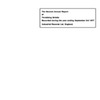 Industrial Records’ reissue series begins with the album that set the tone for a short but potent career. The group’s first album (mischievously titled in order to make people go looking for a non-existent First Annual Report) is a master class in subversive anti-music that still packs a punch. Remastered and released as an LP and also in an expanded CD edition; all the gory details have been put into sharp focus, reanimating the still warm corpse of Throbbing Gristle’s glory days.
Industrial Records’ reissue series begins with the album that set the tone for a short but potent career. The group’s first album (mischievously titled in order to make people go looking for a non-existent First Annual Report) is a master class in subversive anti-music that still packs a punch. Remastered and released as an LP and also in an expanded CD edition; all the gory details have been put into sharp focus, reanimating the still warm corpse of Throbbing Gristle’s glory days.
As I was not born during Throbbing Gristle’s initial activity, I can only imagine how stark and perhaps even boring the album cover for The Second Annual Report looked nestled in between other releases of that time. No graphics and no fancy typography, just a sticker with the barest of information on it. The dour, business-like nature of the sleeve is all the more surprising considering one member of the group was part of the Hypgnosis design firm. However, the simple design reflected the purpose of the album: this was industrial music made in an industrial way for industrial people. The Second Annual Report was meant to look like a normal dossier or file from an ordinary company rather than a piece of revolutionary music history.
While Throbbing Gristle had already released their debut single, "United/Zyklon B Zombie," The Second Annual Report reflected what the band were attempting to do in their live performances more than studio experimentations of the single. Most of the cuts on the A-side were taken from live shows, several versions of "Slug Bait" and "Maggot Death" forming the first half of the album. It goes without saying that within the repetitions of these pieces, there was huge variation as they used the basic ideas of each piece to springboard into terra incognita. The horror, the humor and the hullabaloo all coming together to make a form of atonal racket that has often been copied but never did it sound so vital. The schlock of "Slug Bait" jumps between the viscerally disgusting to the absurdly funny. However, the over-the-top weirdness of the first two versions of "Slug Bait" is countered by the version from Brighton where the group sample a disturbing interview of a child molester and murderer.
This dichotomy between the tongue-in-cheek moments and incredibly dark subject matter sums up everything that is enthralling about Throbbing Gristle, and the reason this album still resonates with listeners today. Yes, some of the material and imagery is rich pickings for an easy shock factor but by dressing it all up in a pseudo-industrial package and throwing campy Carry On… style humor into the mix, Throbbing Gristle highlighted the double standards, hypocrisy and corruption at the heart of British society. If they were the wreckers of civilization, it was only because civilization was a harsh reality that needed wrecking.
The B-side of the album was given over to the group’s soundtrack to After Cease to Exist, a grainy film made during the COUM Transmission days featuring Chris Carter getting castrated (which made his child with Cosey Fanni Tutti a few years later quite the miracle!). The piece lacks the violence of the first half of the album, at odds with the imagery that it was meant to accompany. It is one of Throbbing Gristle’s dreamier moments, especially in the early years.
The CD reissue of The Second Annual Report features an extra disc of bonus material including the tracks from the debut single (much like the original CD reissue) and selections from live shows from the same time period. None of this material is new but I imagine the live material will be unheard for many people considering the price and rarity of any previous live releases (not all these cuts were available outside the early live tapes, live compilation CDs or the various versions of TG24). The live material is fantastic but having got all these recordings already, I would have preferred to have seen some more exclusive extras (such as other studio cuts, if they exist) or a DVD of After Cease to Exist.
It is not the extras that matter when it comes to this reissue series, it is the fact that these albums have been given a long overdue facelift by Chris Carter and are widely available again. While Throbbing Gristle may never have the cultural caché of the likes of The Velvet Underground or Kraftwerk, I honestly believe they were responsible for an equally important shift in music and, as such, the chance to re-evaluate them in the best possible way is a welcome experience.
samples:
 
Read More


